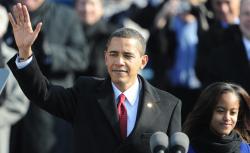Occasional poems, or poems crafted for a particular event, are notoriously tough to pull off. Inauguration poems might be the trickiest of all, requiring a kind of ringing, triumphal, sentimental tone that seems at odds with the evasions and double-backs of so much good poetry.
Take John F. Kennedy’s suggested revision to “The Gift Outright,” by Robert Frost, which Frost recited in 1961 as the nation’s first ever inaugural poet. The original last line, voicing an unrealized dream for America, read, “Such as she was, such as she might become.” But a buoyant Kennedy proposed replacing “might” with “will,” so that the line became the more assertive proclamation, “such as she will become.” It’s a small detail, but one that tips out a dram of the verse’s subtlety and hints at why inaugural poems can be such bears to write. It’s no wonder that criticizing them after the fact has turned into something of a national pastime.
So who gets to groom the rough beast that is the inaugural poem for U.S. President Barack Obama’s second term? On Wednesday the Obama camp announced that they’ve picked Cuban-American writer Richard Blanco, a child of exiled parents who identifies with the president’s multicultural roots and relishes his message of inclusiveness. “Since the beginning of the campaign, I totally related to [Obama’s] life story and the way he speaks of his family,” Blanco told the New York Times. “There has always been a spiritual connection in that sense. I feel in some ways that when I’m writing about my family, I’m writing about him.”
Of course, at the Jan. 21 inauguration ceremony, Blanco must address not only Obama but the entire world. He confided in an NPR interview that his main hurdle will be to “maintain sort of that sense of intimacy and that conversational tone in a poem that obviously has to sort of encompass a whole lot more than just my family and my experience.” Walking such a tightrope—the poet as creative individual, the poet as mouthpiece for something bigger—should test Blanco in interesting ways, especially given that his self-image as an outsider provides a through line for much of his work. At 44, the Maine-dwelling former teacher will be the youngest poet to deliver an inaugural poem, as well as the first Latino and the first openly gay man. His first two books, City of a Hundred Fires (1998) and Directions to the Beach of the Dead (2005), focus on what it means to move back and forth between cultures, constructing “home” in the rich but uncertain space between. “I see…the wiry roots she pulled out of the very ground,” he writes about his mom in “Mother Picking Produce.” “Now…the grapes look like dusty rubies in her hands.”
This year’s Looking for the Gulf Motel reflects more squarely on the friction between Blanco’s homosexuality and his macho Latin upbringing. In “Maybe” (subtitled “For Craig”), the speaker yearns for white-picket-fence normalcy: “Maybe there’d finally be a house, a dog/ named Chu, a lawn to mow, neighbors,/ dinner parties, and you.” There’s some change we can believe in.
Blanco, a civil engineer by day and a versifier by night, lays an almost techie polish on his writing. Poems like “Marco Island, Florida” have architectural features—refrains, anaphora—that give you a glimpse of how they were built. (American manufacturing! It’s returned to poetry, too.) Can Blanco construct something for Jan. 21 that doesn’t make poetry lovers cry out in pain? Anything’s possible. If he doesn’t succeed, though, consider it the curse of the inaugural poem.
